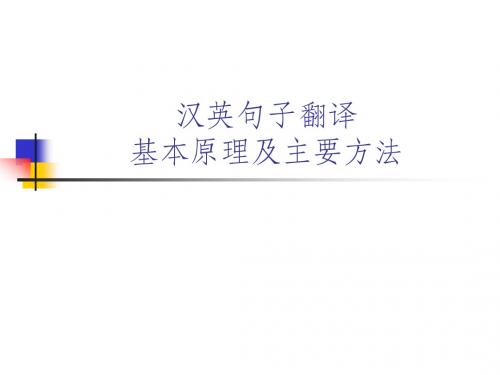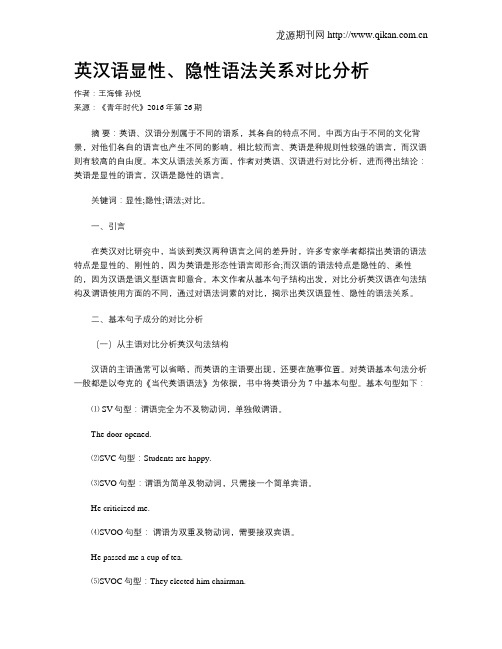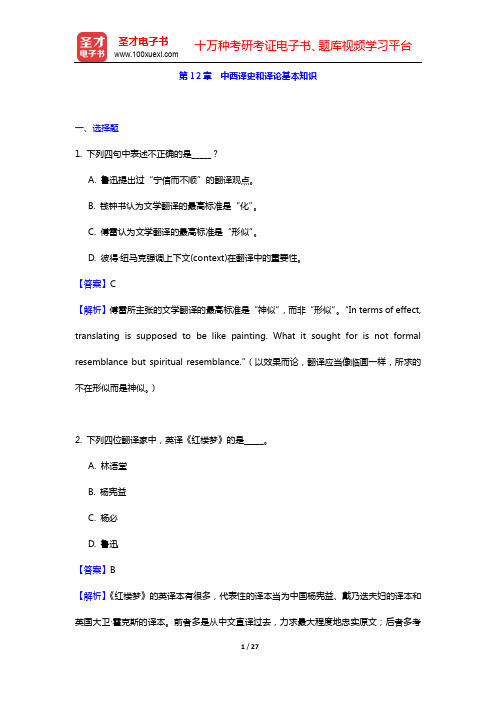翻译显性
- 格式:ppt
- 大小:11.23 MB
- 文档页数:14

在汉译教学中,显性与隐性衔接手段是指在译文中使用的指示性词汇和表达方式,用来表明原文中的信息和语义在译文中的对应关系。
连贯则是指译文中的句子之间的关联性和流畅性。
显性衔接手段包括使用连词和关联词,如“因此”、“但是”、“反之”等,以及使用代词和同位语,如“它”、“这”、“那”、“前者”、“后者”等。
隐性衔接手段则是在不使用明显的衔接词的情况下,使用语义、语法和语体等手段来表明句子之间的关联。
例如,使用同一个句子的主语或动词,或者使用与前一句相关的信息作为后一句的补充说明。
在汉译教学中,连贯是指使译文的句子之间相互联系,使译文流畅、连贯,这样才能更好地表达原文的含义。
连贯可以通过使用合理的句子结构、适当的衔接手段以及正确的语法来实现。
除了使用显性和隐性衔接手段和注意连贯之外,在汉译教学中还有一些其他重要的方面需要注意:1.重视语境。
在翻译时,应该注意原文的语境,并努力在译文中保留原文的语境信息。
2.注意语体。
应该根据原文的语体,使用合适的语言表达方式来翻译。
3.注意语言风格。
应该根据原文的语言风格,使用合适的语言表达方式来翻译。
4.注意译文的可读性。
应该使译文易于理解,并尽量使其具有自然的口语风格。
5.注意汉语语法。
应该注意遵循汉语的语法规则,使译文的句子结构合理、流畅。
6.多读多练。
多读各种不同类型的译文,并多练习翻译,可以帮助提高翻译能力。
在汉译教学中,还有一些技巧可以帮助提高翻译能力:1.分析原文。
在翻译前,应该仔细分析原文,弄清其中的信息、语义和语言特点。
2.正确理解原文。
在翻译时,应该保证对原文的理解是正确的,并确保译文的准确性。
3.确定翻译目标。
应该明确翻译的目的,并根据不同的目的选择合适的翻译方式。
4.注意语义对应。
在翻译时,应该注意保留原文的语义,并在译文中尽量使用最接近原文的表达方式。
5.多使用词汇和句式。
应该积累大量的词汇和句式,这样可以在翻译时更快地找到合适的表达方式。
6.尽量使用汉语本身的表达方式。

英汉“显性”与“隐性”文化语义的翻译缪 敏1,张传彪2(1.福州职业技术学院应用外语系,福建福州350108;2.福建工程学院外语系,福建福州350108) 摘 要:无论是显性文化语义还是隐性文化语义,都蕴含着一个民族独特的文化信息。
鉴于异质文化之间的“异”远大过“同”,文化语义的翻译切忌字面照搬,相比之下语境等效翻译,也即Nida 提倡的“动态对等翻译”和New 2mark 倡导的“交际翻译”效果更为理想。
关键词:显性文化语义;隐性文化语义;翻译 中图分类号:H315.9 文献标识码:A 文章编号:167129247(2008)0420075203On T acit and E xplicit Cultural S em antics in E nglish -Chinese T ranslationMIAO Min 1,ZH ANG Chu an 2bi ao 2(1.Applied Foreign Language Department ,Fuzhou Vocational T echnology Institute ,Fuzhou 350108,Fujian ,China ;2.Foreign Language Department ,Fujian Engineering Institute ,Fuzhou 350108,Fujian ,China ) Abstract :Both tacit cultural semantics and explicit cultural semantics contain some unique ethnic cultural information of a nation.T ranslation of cultural semantics should not be done literally because difference between Chinese culture and An 2gro 2American culture is too great.In contrast ,Nida ’s equivalent translation ,in other words ,dynamic equivalence ,and Ne 2wmark ’s communicative translation seem to be a better approach to ideal effect in E 2C and C 2E translation. K ey w ords :tacit cultural semantics ;explicit cultural semantics ;English 2Chinese translation 在中国,“日子过得红红火火”其喻意尽人皆知,可把它照搬进英语(One ’s life is as red as fire ),能听懂的英美人恐怕寥寥无几。


第一章绪论1.1 翻译的性质和分类1. 翻译的定义:Definition of translation翻译是将一种语言文化承载的意义转换到另一种语言文化中的跨语言、跨文化的交际活动。
翻译的本质是释义,是意义的转换。
2. 翻译的分类:Classification of translation按文本而言,分为文学翻译、科级翻译、应用文翻译就方式而言,分为全译、摘译、编译。
全译:全文照译,全译是翻译的最基本方式,它是翻译的基础。
摘译:根据特定目的的摘取、翻译原文中的部分内用,以利译文读者更方便,更快捷的获取原文文献主要信息的方式。
编译:则是“编辑”和“”翻译的结合。
3.翻译活动涉及的因素:Factors involved in translation activities译者:translator, 作者:author, 原文: source text,原文读者: source-text readers译文:target text/translated text/target version, 译文读者: target-text readers1.2 汉英翻译的单位----句子C-E Translation Unit句子:句子是用词或词组构成的一个能够表达一个完整意思的语言单位。
每个句子都有一定的语调,表示陈述、疑问、祈使、感叹等语气。
在连续说话时,句子和句子中间有一个较大的停顿。
在书面上,句子的停顿处,要根据不同的语调分别用句号、问号火感叹号。
(定义来自《汉语大辞典》)从意义上讲,句子能够表示一个完整的意思从功能上讲,句子表示陈述、疑问、祈使、感叹等语气从形态上讲,句末有句号、问号或感叹号为标志因此,句子是较为理想的翻译单位。
1.3 汉英翻译的标准Standards for C-E TranslationChinese translation standards1.严复的标准信:faithfulness 指准确的传达原文的内容,即信于读者和作者,不允许对原作有任何歪曲或篡改,译作不容许有任何遗漏和省略。

英汉语显性、隐性语法关系对比分析作者:王海锋孙悦来源:《青年时代》2016年第26期摘要:英语、汉语分别属于不同的语系,其各自的特点不同。
中西方由于不同的文化背景,对他们各自的语言也产生不同的影响。
相比较而言、英语是种规则性较强的语言,而汉语则有较高的自由度。
本文从语法关系方面,作者对英语、汉语进行对比分析,进而得出结论:英语是显性的语言,汉语是隐性的语言。
关键词:显性;隐性;语法;对比。
一、引言在英汉对比研究中,当谈到英汉两种语言之间的差异时,许多专家学者都指出英语的语法特点是显性的、刚性的,因为英语是形态性语言即形合;而汉语的语法特点是隐性的、柔性的,因为汉语是语义型语言即意合。
本文作者从基本句子结构出发,对比分析英汉语在句法结构及谓语使用方面的不同,通过对语法词素的对比,揭示出英汉语显性、隐性的语法关系。
二、基本句子成分的对比分析(一)从主语对比分析英汉句法结构汉语的主语通常可以省略,而英语的主语要出现,还要在施事位置。
对英语基本句法分析一般都是以夸克的《当代英语语法》为依据,书中将英语分为7中基本句型。
基本句型如下:⑴ SV句型:谓语完全为不及物动词,单独做谓语。
The door opened.⑵SVC句型:Students are happy.⑶SVO句型:谓语为简单及物动词,只需接一个简单宾语。
He criticized me.⑷SVOO句型:谓语为双重及物动词,需要接双宾语。
He passed me a cup of tea.⑸SVOC句型:They elected him chairman.⑹SVOA句型:谓语动词为动补性复杂动词,需要接宾语和动词补足语(补充说明动词的状语)作补足成分。
Fate has treated him truly.⑺SVA句型:The state has stood for centuries.从英语的7种基本句型中可以看出英语的主语是必不可少的,而且要放在句首。

第12章中西译史和译论基本知识一、选择题1. 下列四句中表述不正确的是_____?A. 鲁迅提出过“宁信而不顺”的翻译观点。
B. 钱钟书认为文学翻译的最高标准是“化”。
C. 傅雷认为文学翻译的最高标准是“形似”。
D. 彼得·纽马克强调上下文(context)在翻译中的重要性。
【答案】C【解析】傅雷所主张的文学翻译的最高标准是“神似”,而非“形似”。
“In terms of effect, translating is supposed to be like painting. What it sought for is not formal resemblance but spiritual resemblance.”(以效果而论,翻译应当像临画一样,所求的不在形似而是神似。
)2. 下列四位翻译家中,英译《红楼梦》的是_____。
A. 林语堂B. 杨宪益C. 杨必D. 鲁迅【答案】B【解析】《红楼梦》的英译本有很多,代表性的译本当为中国杨宪益、戴乃迭夫妇的译本和英国大卫·霍克斯的译本。
前者多是从中文直译过去,力求最大程度地忠实原文;后者多考虑国外读者的阅读习惯和审美感受,行文更符合英语的话语方式。
3. _____翻译了莎士比亚的全部戏剧作品。
A. 朱生豪B. 卞之琳C. 梁实秋D. 林语堂【答案】A【解析】朱生豪子1936年着手翻译《莎士比亚戏剧全集》,为便于中国读者阅读,打破了英国牛津版按写作年代编排的次序,而分为喜剧、悲剧、史剧、杂剧4类编排,自成体系。
1937年日军进攻上海,辗转流徙,贫病交加,仍坚持翻译,先后译有莎剧31种,新中国成立前出版27种,部分散失,后因劳累过度患肺病早逝。
4. 多用被动语态是_____的一个比较明显的语法特点。
A. 广告英语B. 科技英语C. 新闻英语D. 法律英语【答案】B【解析】为了保证科技文本陈述的客观性、突出信息重心和关注焦点,科技英语往往大量使用被动语态。
朱莉安·豪斯的翻译质量评估模式研究作者:吕菲来源:《文学教育》2009年第03期在翻译理论建设的过程中,翻译批评始终是不可或缺的环节。
其在借助于翻译理论对译作进行分析的同时,又会丰富和发展翻译理论,对翻译实践也起到一定的促进作用。
翻译批评即是“依照一定的翻译标准,采用某种论证方法,对一部译作进行分析、评论、评价,或通过比较一部作品的不同译本对翻译中的某种现象做出评论。
”其中翻译质量评估(即翻译评价)是“高度客观化的翻译批评形式”,对其的研究,对翻译学的发展有着理论和实践意义。
但总观20世纪70年代之前的中西方翻译史,并没有出现完整而系统的质量评估理论,只是零碎的出现在一些翻译家译作的序言,或是附带在翻译理论家对翻译标准的阐释中。
70年代之后,翻译质量评估引起了学者们的重视,并取得了一定的发展。
第一个提出完整的翻译质量评估模式的是德国学者朱莉安·豪斯在其《翻译质量评估模式》及其修订本《翻译质量评估——修订的模式》中提出。
本文试对这一模式进行系统的描述,并指出其在实践过程中存在的不足。
一、模式简述翻译评估的有效性取决于对翻译质量的定义。
对翻译质量的正确认识,才能做出科学的评估。
所以首先要依据一定的翻译理论。
不同的理论会导致不同的翻译质量定义,因而也会产生不同的评估方法。
要评估译文的质量,首先必须弄清什么是翻译。
正如卡特福德指出“翻译实践的中心问题就在于寻找等值成分,翻译理论的中心任务就是确立等值成分的性质和条件。
”翻译的本质是对等,但究竟等值的是什么。
豪斯认为:对等并不是形式、句法和词汇上的相似,而功能和语用对等。
豪斯认为翻译的实质在于“意义”从一种语言转移到另一种语言时保持不变。
这里的意义包括三个方面:语义、语用和语篇意义。
基于此,豪斯定义翻译就是用语义和语用对等的译语文本代替原语文本。
对译文质量的判断,就是要看译文是否在这三种意义上与原文对等。
同时,豪斯认为要实现文本的对等,译文文本应该有一个功能和原文文本的对等。
翻译中的隐和显二、英汉翻译中显化的定义和分类显化(Manifestation)作为一种翻译策略,在英汉互译的过程中主要指的是译者为了增强目标语言读者的理解力和接受度,有意识地选择将源语文本中的某些隐含意义、文化背景信息或者修辞手法更加明确、直观地表达出来。
在实际翻译实践中,显化不仅体现在词汇层面的选择,如通过添加注释、替换更易于理解的词语或短语来传达原文的深层含义,还表现在句法结构的重构以及文化元素的阐释上。
词汇显化:当源语言中的某个词或习语具有丰富的文化内涵而目标语言缺乏直接对应的表达时,译者可能会采取扩展性翻译方法,即将原文的隐晦之处具体化,例如将一串英文成语直译成包含多个汉语词汇以充分展现其完整意蕴。
语法显化:在处理一些具有复杂语法结构的句子时,为了确保信息传递的清晰无误,译者可能需要调整原文的句式结构,使之更符合目标语言的习惯表达方式,从而显化原本可能隐藏在曲折句法中的关键信息。
文化显化:鉴于英汉两种语言背后的文化差异,有些文化特定的概念、习俗或历史背景在翻译时若不做适当说明,可能难以被对方文化圈的读者所理解。
文化显化包括将原文中潜在的文化暗示直接翻译并加以解释,或者采用类比、注解等方式让目标读者能够把握原文的文化含义。
英汉翻译中的显化是一种旨在跨越语言与文化鸿沟,实现有效沟通的重要手段,它要求译者在忠实于原文的同时,具备敏锐的文化洞察力和灵活的语言运用能力,以恰如其分的方式揭示原文中那些可能被目标语言读者所忽视的隐含信息。
1. 语义显化:将原文中的隐含意义转化为明确的意义表达在翻译过程中,语义显化是一种重要的策略,它涉及将原文中隐含或含糊的意义转化为目标语言中的明确表达。
这种转换不仅涉及词汇的选择和句式的调整,还包括对原文文化背景和语境的理解。
语义显化的目的是使译文更加清晰、准确,便于目标语言的读者理解。
语义显化要求译者深入理解原文的语义内容。
这包括对词汇、短语、习语以及句子结构的全面把握。